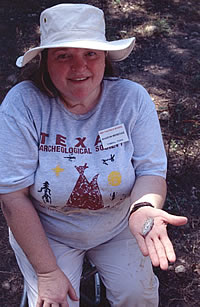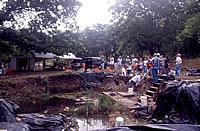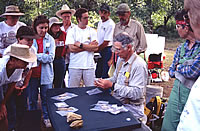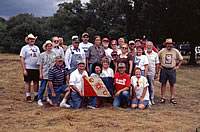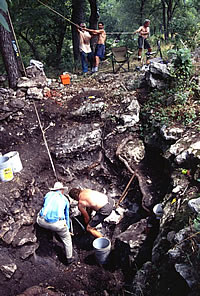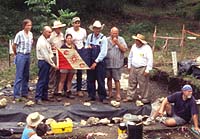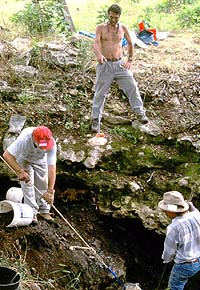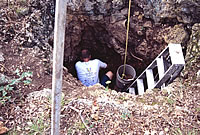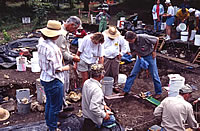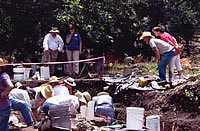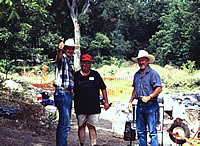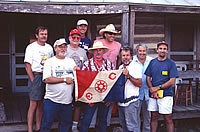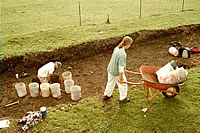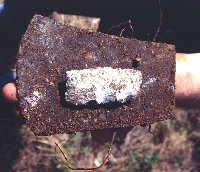TAS Field School Photo Gallery |
||
|
TAS member Sharon Menegaz from Tomball, Texas shows off a Hoxie dart
point from the later deposits at Gault.
Visitors gather around the Lindsey Pit, one of
the main excavation areas where Clovis deposits have been exposed.
This area is difficult to work in because of the high water table.
TAS members gather around Mike Collins for a hands-on introduction
to Clovis tools.
Field school supervisors and crew chiefs rally
around the Explorer's Club expedition flag.
TAS members struggle to remove a large rock from
what was at first thought to be another sinkhole. As the excavations
progressed, it proved to be a small rockshelter that had been filled
by sediment. Archaic artifacts were found within the shelter and
it is hoped that older deposits are represented in its lower reaches.
|
In June 2001, the Texas Archeological Society held its Annual Field School at the Gault site and other nearby localities. An average of 120 TAS members per day worked at the Gault site excavating and manning the water screens. Others helped with the laboratory processing, took part in a regional survey, and worked at the Bowmer site elsewhere in Bell County. Here are a few of the many scenes of the work in progress at Gault. To learn more about TAS and annual TAS field schools, visit www.txarch.org/. Mike Collins gives participants in the 2001 TAS
Field School an overview of Clovis technology.
Volunteers from the 2001 Texas Archeological Society
Field School proudly show off an Expedition Flag from the Explorers
Club of New York. This well-traveled flag has been to the South
Pole and many other places in the world.
TAS field school participants remove buckets of soil
from a deep sinkhole at the Gault site. The hope was that undisturbed
Clovis deposits would be found. Instead the sinkhole had a mix of
ancient and historic artifacts, indicating it had been filled in
recent times.
Case Mumpire digs within the narrow confines of the sinkhole.
|
While TAS members dug mightily in search of Clovis
artifacts, landowner Ricky Lindsey walked up to an exposed profile
and found a Clovis point in the wall.
Click images to enlarge Another Clovis artifact comes to light.
Excavations in progress in Bobcat Area 1. A Bobcat, a small
front-end loader was used to clear away the disturbed upper deposits
above the Clovis deposits.
Landowners Ricky and Howard Lindsey give their
thumbs-up approval of the TAS field school to TAS President Skip
Kenedy (in the middle).
Members of the regional survey team get their
turn with the Explorer's Club flag.
Buckets on the move. The white plastic buckets
seen in almost every excavation photo are essential to the operation.
All hand-excavated sediment from the Clovis deposits is water-screened
to recover small items.
This iron axe and a 13,000 year-old Clovis perform were found
within a few feet of one another at the bottom of the sinkhole.
|
